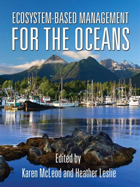
At its core, ecosystem-based management (EBM) is about acknowledging connections. Instead of focusing on the impacts of single activities on the delivery of individual ecosystem services, EBM focuses on the array of services that we receive from marine systems, the interactive and cumulative effects of multiple human activities on these coupled ecological and social systems, and the importance of working towards common goals across sectors. Ecosystem-Based Management for the Oceans provides a conceptual framework for students and professionals who want to understand and utilize this powerful approach. And it employs case studies that draw on the experiences of EBM practitioners to demonstrate how EBM principles can be applied to real-world problems.
The book emphasizes the importance of understanding the factors that contribute to social and ecological resilience —the extent to which a system can maintain its structure, function, and identity in the face of disturbance. Utilizing the resilience framework, professionals can better predict how systems will respond to a variety of disturbances, as well as to a range of management alternatives. Ecosystem-Based Management for the Oceans presents the latest science of resilience, while it provides tools for the design and implementation of responsive EBM solutions.

Humans are terrestrial animals, and our capacity to see and understand the importance and vulnerability of life in the sea has trailed our growing ability to harm it. While conservation biologists are working to address environmental problems humans have created on land, loss of marine biodiversity, including extinctions and habitat degradation, has received much less attention. At the same time, marine sciences such as oceanography and fisheries biology have largely ignored issues of conservation.
Marine Conservation Biology brings together for the first time in a single volume, leading experts from around the world to apply the lessons and thinking of conservation biology to marine issues. Contributors including James M. Acheson, Louis W. Botsford, James T. Carlton, Kristina Gjerde, Selina S. Heppell, Ransom A. Myers, Julia K. Parrish, Stephen R. Palumbi, and Daniel Pauly offer penetrating insights on the nature of marine biodiversity, what threatens it, and what humans can and must do to recover the biological integrity of the world's estuaries, coastal seas, and oceans.
Sections examine: distinctive aspects of marine populations and ecosystems; threats to marine biological diversity, singly and in combination; place-based management of marine ecosystems; the often-neglected human dimensions of marine conservation.
Marine Conservation Biology breaks new ground by creating the conceptual framework for the new field of marine conservation biology -- the science of protecting, recovering, and sustainably using the living sea. It synthesizes the latest knowledge and ideas from leading thinkers in disciplines ranging from larval biology to sociology, making it a must-read for research and teaching faculty, postdoctoral fellows, and graduate and advanced undergraduate students (who share an interest in bringing conservation biology to marine issues). Likewise, its lucid scientific examinations illuminate key issues facing environmental managers, policymakers, advocates, and funders concerned with the health of our oceans.
READERS
Browse our collection.
PUBLISHERS
See BiblioVault's publisher services.
STUDENT SERVICES
Files for college accessibility offices.
UChicago Accessibility Resources
home | accessibility | search | about | contact us
BiblioVault ® 2001 - 2024
The University of Chicago Press









